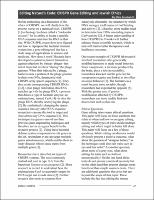Please use this identifier to cite or link to this item:
https://hdl.handle.net/20.500.12202/8918Full metadata record
| DC Field | Value | Language |
|---|---|---|
| dc.contributor.author | Krautwirth, Rina | - |
| dc.date.accessioned | 2023-05-22T15:20:56Z | - |
| dc.date.available | 2023-05-22T15:20:56Z | - |
| dc.date.issued | 2023 | - |
| dc.identifier.citation | Krautwirth, R. (2022-2023). Editing nature’s code: CRISPR gene editing and Jewish ethics. Derech HaTeva, 27, 27-33. | en_US |
| dc.identifier.uri | https://hdl.handle.net/20.500.12202/8918 | - |
| dc.description | Article | en_US |
| dc.description.abstract | Before embarking on a discussion of the ethics of CRISPR, we will clarify how the process works on a technical level. CRISPR [1] technology has been called a “molecular scissors” for its ability to locate a specific DNA sequence and slice the DNA at that site. With CRISPR, researchers have figured out how to repurpose the bacterial immune system into a gene editing tool that has a wide range of applications in science and medicine. How does it work? Bacteria have developed a system to protect themselves against infections by viruses–phages–that infect them that involves “slicing” the phage genome. When first infected by a phage, bacteria store a portion of the phage genome in their own DNA, demarcated with CRISPR array spacer sequences [2]. They then create corresponding CRISPR RNAs [3,2]. Upon phage reinfection, this RNA matches up with the phage DNA, a process that drives a type of bacterial enzyme–an endonuclease, termed Cas9, [4]–to slice the phage DNA, thereby destroying the phage [2]. By synthetically changing the spacer sequence into any other RNA sequence, researchers can use this tool to target and slice almost any DNA sequence [2]. This technique has greater ease of use than previous gene-engineering techniques and therefore serves as a great benefit to the research process [2]. Using these bacterial defense system components to edit genes in the lab, researchers even can target multiple genes simultaneously, which enables them to study diseases whose cause stems from multiple genes [2]. | en_US |
| dc.description.sponsorship | "Much appreciation is expressed to Dr. Fred Grunseid, M.D., and to Dr. Sheri Rosenfeld, M.D., Allied Medical Associates, Brooklyn, NY, for their continued support towards the publication of Derech HaTeva." | en_US |
| dc.language.iso | en_US | en_US |
| dc.publisher | Stern College for Women, Yeshiva University | en_US |
| dc.relation.ispartofseries | Derech HaTeva;vol. 27 ; 2022-2023 | - |
| dc.rights | Attribution-NonCommercial-NoDerivs 3.0 United States | * |
| dc.rights.uri | http://creativecommons.org/licenses/by-nc-nd/3.0/us/ | * |
| dc.subject | CRISPR, ethics | en_US |
| dc.subject | genetic editing | en_US |
| dc.subject | DNA sequence | en_US |
| dc.subject | molecular scissors | en_US |
| dc.subject | RNA sequence | en_US |
| dc.subject | phage genome | en_US |
| dc.title | Editing Nature’s Code: CRISPR Gene Editing and Jewish Ethics By: Rina Krautwirth | en_US |
| dc.type | Article | en_US |
| Appears in Collections: | Library Staff Publications | |
Files in This Item:
| File | Description | Size | Format | |
|---|---|---|---|---|
| Krautwirth Editing nature's code DT 2022-2023 v 27.pdf | 232.33 kB | Adobe PDF |  View/Open |
This item is licensed under a Creative Commons License

